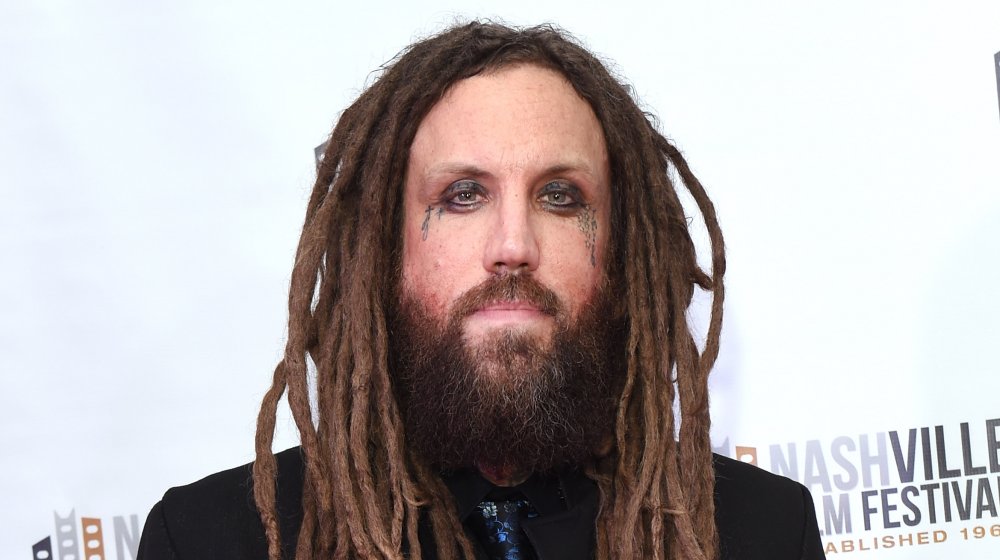The Tragic Real-Life Story Of Korn
Korn loudly stormed out of Bakersfield, California, in the mid-1990s with a couple of heavy metal albums – Korn and Life is Peachy – so casually innovative that they ushered in a whole new scene. Combining hard-edged guitars with house-shaking bass and glass-shattering drums with elements of hip-hop, Korn was at the forefront of "nu metal" or "rap rock," providing the rock sound of the millennium era alongside fellow TRL stalwarts like Limp Bizkit and Kid Rock. Songs like "Blind," "Got the Life," "Freak on a Leash," and "Falling Away from Me" remain rock radio staples and have influenced a generation of introspective and somber rock bands.
What Korn also brought to the table: nuanced, anguished lyrics delivered by singer Jonathan Davis that served as a means of catharsis both for him and Korn's millions of fans. All that pain in Korn's music is real — its members have overcome and endured a lot to get to where they are.
Health problems have almost killed Korn's lead singer twice
The music of Korn, much of it written by Jonathan Davis, deals with pain, trauma, and the subsequent emotional scarring that can last a lifetime. This is a topic with which Davis is quite familiar, experiencing his first major misfortune and hurt at the age of three. That's how old he was when his father divorced his mother, and it's also when he developed a severe case of asthma, which landed him in the hospital countless times over the next seven years. "I was supposed to die," Davis told The Guardian. "I was fighting for my life."
The singer obviously survived into adulthood, and to a high level of rock star fame and fortune with Korn in the 1990s and 2000s. That didn't insulate him from another close brush with death, though. In 2006, Korn performed with a series of guest vocalists at England's Download Festival because Davis fell incredibly ill with a blood disorder called immune thrombocytopenic purpura, triggered by an antibiotic. "I had no platelets, which are the building blocks of your blood," he told Kerrang. "I was pouring blood out of my a**, my gums were bleeding, and I had bruises all over my body." He got better after hospitalization, but the same condition — caused by the same antibiotic Davis took — killed the father of Korn bassist Reginald "Fieldy" Arvizu.
Korn's singer suffered an abusive childhood
Young Jonathan Davis dealt with more than just health problems and hospital stays. As a child and into his teen years growing up in Bakersfield, California, he faced several different kinds of abuse. At age 15, he got heavily into fanciful New Romantic bands — particularly Duran Duran – and looked the part. "I had the makeup, the frilly shirt, all that," Davis told The Guardian. "I suffered for it greatly." He was teased, beat up, and had his sexuality angrily called into question. "I was shoved and kicked and the teachers would laugh and call me a f*ggot." When he'd go into the music store where he worked with his father, his dad would identify him not as his son but as "some kid I hired."
He had trouble at home, too. After he acquired a drum kit, his stepfather destroyed it during an argument. Uncomfortable living in that home, Davis moved in with his father and stepmother, which was an even worse situation. "She made it her mission to make life so miserable for me that I wanted to move out," Davis said, recalling how she'd prank him when he was sick by feeding him drinks made of hot pepper sauce. "She was a twisted, sadistic sh*t."
Working as a mortician's assistant left Korn's singer with PTSD
As a teenager, future Korn singer Jonathan Davis loved horror movies and other kinds of dark and spooky pop culture, and he found himself the most metal job possible that also played into his interests: Davis worked as a mortician's assistant at a funeral home and in the Kern County Coroner's Department in California. Upon graduating high school, he enrolled in the San Francisco College of Mortuary Science, although he later dropped out to work closer to his home in Bakersfield.
Altogether, Davis spent six years working on and around the recently and suddenly deceased, embalming them and performing autopsies, and it left some deep psychological scars. "I saw some really f*cked-up sh*t, which at the time made me a really hard, no-emotions," kind of guy, he told Kerrang. "I had post-traumatic stress from seeing dead babies, and young kids that had died after finding a parent's stash of drugs." Davis said he required "a lot of therapy" to finally make the horrific nightmares he experienced subside.
Korn's guitarist cut off part of his finger
Korn guitarist James "Munky" Shaffer plays in a distinctive and original metal-meets-hip-hop groove manner. Being a musician has clearly worked out well for Shaffer, creatively and professionally, so it's surprising that he only ever took up the guitar after a gruesome injury. According to Leah Furman's Korn: Life in the Pit, a 14-year-old Munky snuck out of his house one night to go to a keg party. As he attempted to ride his bicycle away to an evening of teenage drunken debauchery, the bike's chain came loose and started to make a loud thwacking noise. If he didn't silence that sound immediately, his parents would've heard him trying to ride away, so Munky grabbed for the chain ... at which point the chain and the teeth of the sprocket on the moving bike trapped the teen's index finger, turning it into "a severed, mangled mess."
Munky had no feeling in the partially severed finger at first, but doctors were able to save it. As a form of rehabilitation, and to restore function, a doctor recommended Munky take up an instrument — he picked the guitar.
Jonathan Davis battled addiction and mental illness
By the time he started singing for Korn in his twenties, Jonathan Davis was already using alcohol to self-medicate his emotional wounds, and the substance abuse ramped up when Korn took off. "You see Mötley Crüe and all this debauchery and alcohol and drugs and think, 'That's what I have to do to be a rock star,' " Davis told The Guardian. "So I started drinking a bottle of Jack [Daniels] and a bottle of Jagermeister a day." He followed a pattern when recording an album: rise at 3 p.m., head into the studio, and knock back 30 or so mixed drinks.
Davis also enjoyed "uppers" like meth and cocaine. (He told Rolling Stone that he "was a meth addict" while making Korn's first, self-titled album.) That, and the booze, exacerbated his burgeoning mental illness issues. "I'd be spun out, sleep-deprived, and hearing sh*t," he said. He claims to have spent two years addicted to meth, living in a cycle of being awake for three days, asleep for one whole day, and then needing cocaine to wake up. While recording Korn's 1998 album Follow the Leader, Davis decided to quit drugs — and made up for the difference by drinking more. All that led to two years of frequent panic attacks that would last all day, along with a crippling paranoia that prevented him from eating, so convinced he was that someone was poisoning his food.
Korn's bassist was addicted to drugs, booze, and food
Reginald Arvizu plays bass for Korn, and he has for more than 25 years, where he's known by fans as "Fieldy." (His chubby cheeks gave him a slight resemblance to comic strip cat Garfield, so people called him that, which eventually evolved into Fieldy.) A less innocent and more complicated story: He started the road to alcoholism when he was around 13 or 14 years old.
"Every day we would hide the alcohol, stealing from stores or stealing it from our parents and hiding out in dirt fields and drinking it before school and after school," Arvizu told the Associated Press (via Today). When he became a rock star with Korn, he gained access to unscrupulous doctors who would hang out backstage. "You could get a prescription for anything you want from them," Arvizu said. "They just want to hang out and party."
Fieldy also struggled with food issues. According to his memoir, Got the Life: My Journey of Addiction, Faith, Recovery, and Korn, he wasn't above swiping food scraps off discarded hotel room service trays or out of garbage cans. Arvizu managed to quit it all "cold turkey" after finding religion — the last wish of his dying father.
Drugs and touring led Korn's guitarist to quit
In the band's initial boom period of the 1990s, many members of Korn lived the excessive rock 'n' roll lifestyle to the hilt, perhaps none more so than guitarist Brian "Head" Welch. "We were only sober for just a couple of hours a day in Korn," he told the Las Vegas Review-Journal. By 2003, the garden-variety booze-soaked partying had given way to an overriding addiction to meth for Welch. Before he'd go on tour, he'd shove his supply of drugs in every nook and cranny, inside of clothes, deodorant containers, and emptied vitamin capsules. However, getting high failed to alleviate Welch's displeasure with touring. "Playing in front of thousands of people, it can get lonely," Welch told the Great Falls Tribune.
One day when he was off the road and hanging out at home with his daughter — while high — Welch heard his young daughter singing the lyrics to Korn's not-family-friendly "A.D.I.D.A.S." He suddenly wondered what he was doing with his life, and after attending church on a lark, he had a religious epiphany, kicked drugs, and then, in 2005, quit Korn. (He returned in 2012.)
Korn's original drummer badmouthed and sued the band
The thunderous and propulsive (yet uniquely danceable) drumming on Korn's first six albums came courtesy of David Silveria, part of the band since its pre-Jonathan Davis days when it was known as LAPD. After a temporary absence in the early 2000s to recover from a back injury, he left the band again in 2006 on what was labeled a "hiatus" at the time, according to Rolling Stone. That temporary leave turned into a permanent one when the rest of Korn promoted temporary fill-in drummer Ray Luzier to full member status.
However, according to TMZ, Silveria never forfeited his ownership stake in Korn, so in 2015, he filed a suit against his old bandmates, asking a court to compel the rest of the group to reveal how much money it had earned since he'd departed, in order for him to get a cut. Then, at that point, he wanted the business partnership to end. Adding insult to legal injury, Silveria called out bassist Reginald "Fieldy" Arvizu on Facebook (via Metal Hammer), calling him "a cowardly little b*tch." So, then, don't look for a reunion of the golden-era Korn lineup anytime soon.
Jonathan Davis' wife died of a drug overdose
After divorcing his high school sweetheart, Korn frontman Jonathan Davis found what he thought would be everlasting love, marrying former adult film star Deven Davis in 2004, according to Revolver. It didn't work out — in 2016, per TMZ, the singer filed for divorce from the actress, reporting that her two-decade-long dependencies on cocaine, nitrous oxide, and prescription painkillers had caused emotional harm to their two young children in the form of neglect. Six trips to rehab hadn't much helped, and in addition to filing for divorce, Jonathan Davis asked for and received a domestic violence-related restraining order against his estranged wife on August 17, 2018.
Tragically, that very same day, Deven Davis, after spending time in a sober living home and disappearing for a week, was found dead in Bakersfield, California. An autopsy obtained by TMZ showed that the 39-year-old had consumed a fatal combination of five drugs: heroin, cocaine, an anti-anxiety drug, a nerve pain medication, and an antidepressant.









